Follow Your Different
356 Unbroken Spirit: The Fight To Save American Wild Horses with Scott Wilson of American Wild Horse Conservation
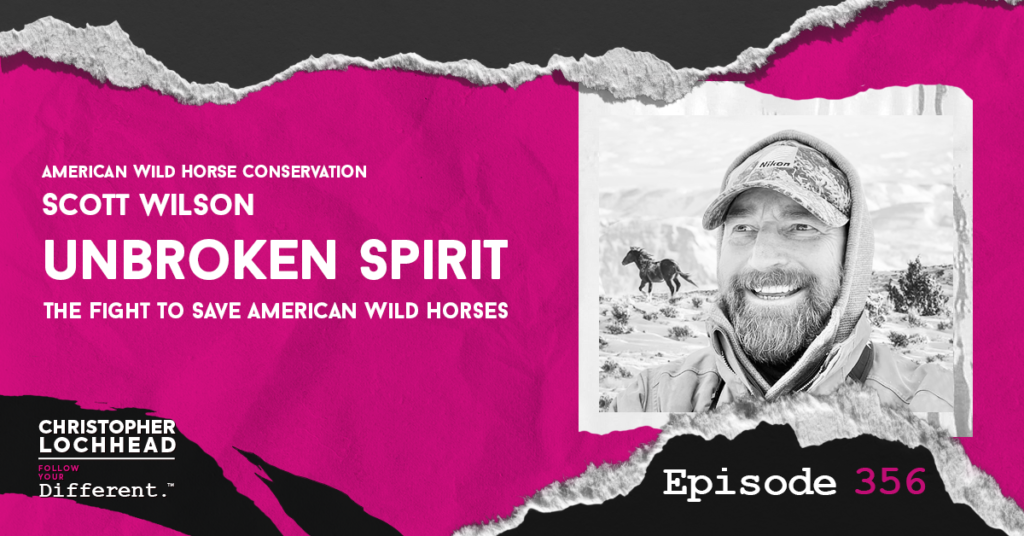
Podcast: Play in new window | Download (Duration: 58:41 — 40.3MB) | Embed
Subscribe: Apple Podcasts | Spotify | Pandora | RSS | More
Here at Christopher Lochhead: Follow Your Different, we’ve had the privilege of engaging in conversations that are not just thought-provoking, but also deeply impactful. On this episode, we sit down with Scott Wilson, the passionate co-founder of American Wild Horse Conservation, to discuss a topic close to both our hearts: the plight of America’s wild horses and the ongoing efforts to preserve and protect these magnificent creatures.
Scott Wilson is a renowned Colorado Nature Photographer and Communications Leader, whose journey took an unexpected turn when he discovered the plight of America’s wild horses. Scott became captivated by the freedom and majesty of the wild horses roaming the western United States. His realization that these iconic animals were facing threats to their survival inspired him to take action and co-found American Wild Horse Conservation. This non-profit organization is dedicated to preserving and protecting wild horses, which have played a pivotal role in the nation’s history and ecology.
This captivating conversation illuminates the plight of these majestic creatures, and the tireless efforts to secure their freedom and ensure their survival.
You’re listening to Christopher Lochhead: Follow Your Different. We are the real dialogue podcast for people with a different mind. So get your mind in a different place, and hey ho, let’s go.
Scott Wilson on the Historical Tapestry of America’s Wild Horses
The history of wild horses in the United States is as rich and complex as the country itself. Scott Wilson shares that there are approximately 65,000 wild horses roaming free across ten states in the western United States.
It’s also a little-known fact that all the world’s horses have their origins in North America, and they were reintroduced in the 1500s. These animals are not just a part of the natural ecology but are woven into the very tapestry of our nation’s history.
In 1971, the Wild Horse and Burro Protection Act was a promise made to these animals—a promise that we are duty-bound to uphold. As we delved into the significance of wild horses, it became clear that they are not just symbols of the wild but are key players in the ecological balance of our public lands.
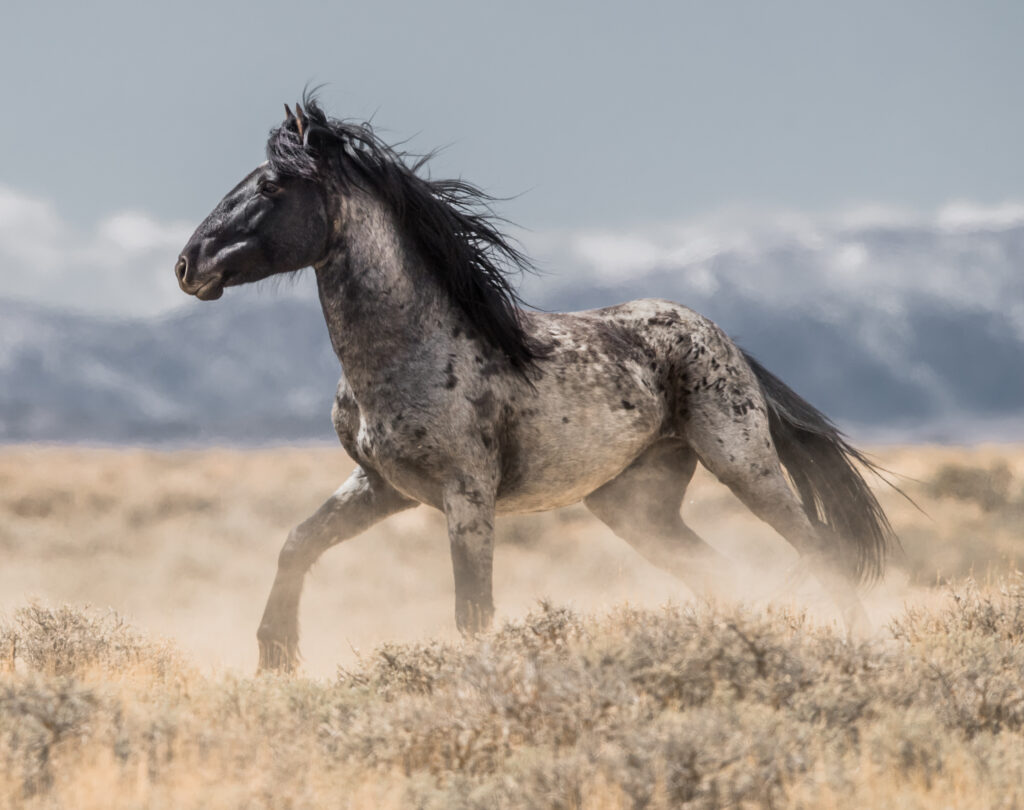
Wild Blue Roan by Scott Wilson of the American Wild Horse Conservation
Scott Wilson on the Struggle for Space and Survival
Given these facts, it was unsettling to learn that wild horses are allocated a mere 2% of public lands. Contrary to popular belief, these horses are not in competition for building or economic development. In fact, only 1% of the nation’s beef is produced on these lands, debunking the myth that wild horses pose a significant threat to our economy.
However, the challenges they face are real and pressing. Competition with livestock, encroachment by oil and gas businesses, and government policies that often do more harm than good are just a few of the hurdles wild horses must overcome to survive.
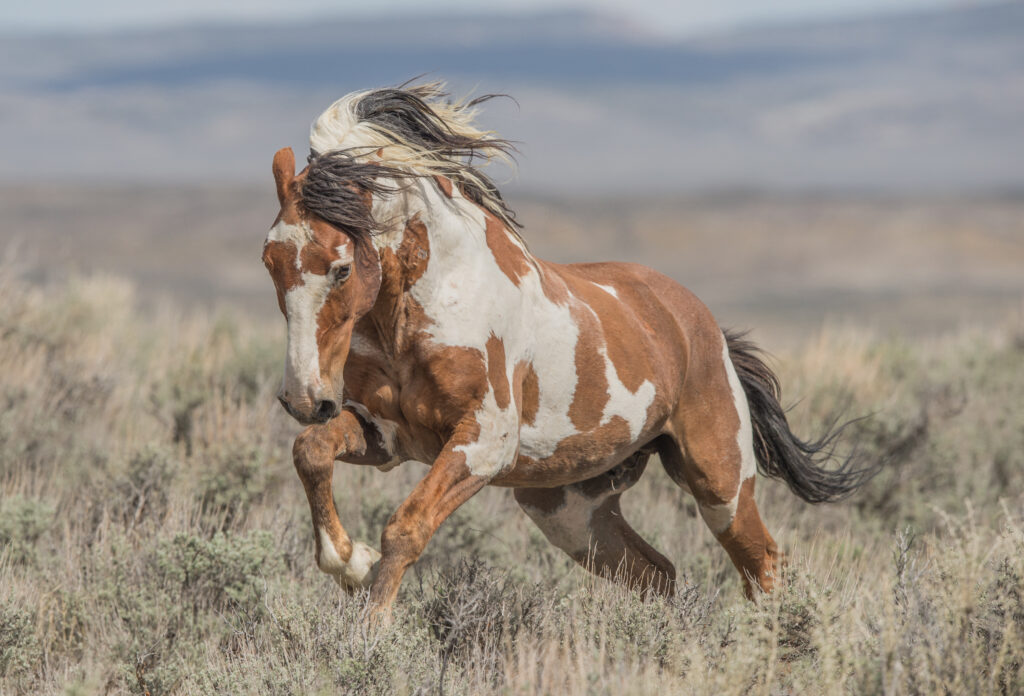
Wild Pinto Stallion Picasso by Scott Wilson of the American Wild Horse Conservation
Nevada: The Heartland of Wild Horses
It’s a surprising fact that roughly half of the wild horse population in the US is concentrated in Nevada. This distribution has significant implications for conservation efforts and the management of these animals.
That being said, Scott Wilson’s initiative to buy back land and expand the habitat for wild horses is a beacon of hope. The acquisition of 3500 acres in Nevada and the establishment of a land trust are steps toward ensuring that wild horses and other wildlife can coexist peacefully.
To hear more from Scott Wilson and how American Wild Horse Conservation help protect these majestic creatures, download and listen to the episode.

Freedom by Scott Wilson of the American Wild Horse Conservation
Bio
A brand-builder and landscape photographer of twenty years, Scott Wilson found his conservation voice after a prolonged battle with stage 4 colon cancer refocused his lens on Colorado’s wildlife, leading to the life-changing discovery of a remote and mesmerizing herd of wild horses in Sand Wash Basin, on the border with Wyoming.
While an early photographic encounter with a wild tricolored pinto mustang named Picasso helped change the focus of Scott’s career as an artist, it was an impending federal roundup, threatening the very survival of the herd, that unlocked his voice as an advocate, and he has since campaigned for better outcomes for wild horses, behind and in front of the lens, both as a spokesperson and strategist for American Wild Horse Conservation, the nation’s leading wild horse conservation NGO.
Anger Management, a statement piece about the conservation challenges facing wild horses in the American west, earned Open Photographer of the Year and Natural World and Wildlife Awards in the 2022 Sony World Photography Awards, raising awareness of wild horse issues in more than 140 countries.
Scott is a contributor to We Animals Media, the world’s largest animal photojournalism agency, and his PhotoAdvocacy work has featured in local, national and international media, including the BBC, Daily Telegraph, Nat Geo España, GQ Italia, Advanced Photographer, Denver Post, 5280, 303, Westword and Colorado Life Magazine.
Scott operates Colorado’s Wild Horse Art Gallery within Gallery 6 – voted Westword Denver’s Best Photography Gallery in 2023 – in the heart of Denver’s Art District, where he also serves as Art District President.
Links
Connect with Scott Wilson
American Wild Horse Conservation | Instagram | Facebook
Check out more images of these majestic wild horses at the Photo Advocacy website & their Instagram!
We hope you enjoyed this episode of Christopher Lochhead: Follow Your Different™! Christopher loves hearing from his listeners. Feel free to email him, connect on Facebook, Twitter, Instagram, and subscribe on Apple Podcast / Spotify!
355 How To Win On Shark Tank, Create A Category, & Save Billions of Butts with Sean Riley, Chief Dude at DUDE Wipes
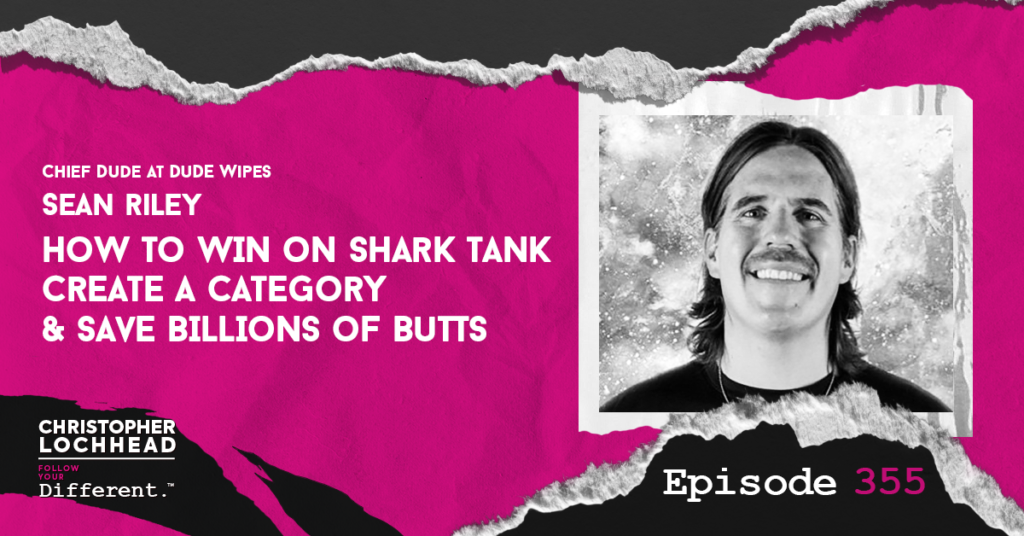
Podcast: Play in new window | Download (Duration: 1:10:53 — 48.7MB) | Embed
Subscribe: Apple Podcasts | Spotify | Pandora | RSS | More
On this episode of Christopher Lochhead: Follow Your Different, we have the pleasure of welcoming Sean Riley, the co-founder of Dude Wipes.
For those unfamiliar with it, Dude Wipes is a brand that has revolutionized the concept of personal hygiene with a superior alternative to traditional toilet paper. Sean shares the story of how Dude Wipes catapulted to legendary success, including securing a deal with Mark Cuban on Shark Tank and being recognized as one of the top five greatest Shark Tank entrepreneurs.
Our conversation was not only enlightening, but also a testament to the power of innovation and strategic category design in entrepreneurship.
You’re listening to Christopher Lochhead: Follow Your Different. We are the real dialogue podcast for people with a different mind. So get your mind in a different place, and hey ho, let’s go.
Sean Riley on Disrupting the Market with Practical Innovation
The conversation starts off with Sean’s mustache and how well everyone’s taking to it. Sean’s distinctive mustache isn’t just a personal style choice; it’s become a branding asset for Dude Wipes. Pivoting from that, Sean discusses the significance of the brand and its deep resonance with consumers. The name “Dude Wipes” itself is a stroke of genius, encapsulating humor, authenticity, and a bold approach to male hygiene.
The conversation then veered towards the practicality of Dude Wipes. Sean emphasizes the universal dissatisfaction with traditional toilet paper and the need for a better solution, especially for men on the go. He explores the potential for Dude Wipes to become as ubiquitous as toilet paper, with the aim of making the product more accessible and convenient for consumers.
Drawing parallels with Gojo Industries, the category king of liquid soap and Purell hand sanitizer, Christopher highlights the reframing of the problem and the potential for Dude Wipes to create a new category in the hygiene space. Despite initial skepticism, Sean’s commitment to disrupting the toilet paper market remains unwavering.
Sean Riley on Overcoming Skepticism and Embracing Category Potential
In the early days, Dude Wipes faced challenges and skepticism. However, Sean and his team were confident in their product’s appeal to men.
They understood that by creating a better product, they could carve out a new space in the male market. Sean’s insights on the importance of category potential and market dynamics were particularly enlightening, emphasizing the significance of entering a growing category with unique offerings.
The Shark Tank Effect: A Pivotal Moment for Dude Wipes
Sean provides an overview of Dude Wipes’ impressive sales figures and distribution channels, highlighting the company’s organic growth and resourceful brand-building approach. Reflecting on their Shark Tank experience, Sean recounts the unexpected turn of events when Mark Cuban offered them a deal, marking a pivotal moment for the company.
Sean’s passion and determination were palpable as he recounted the journey of building Dude Wipes and overcoming challenges to achieve success.
To hear more from Sean Riley and to receive valuable insights into entrepreneurship, category design, and the power of believing in a product’s potential, download and listen to this episode.
Bio
Sean Riley is the co-founder and driving force behind Dude Wipes, a groundbreaking brand in personal hygiene. With a business degree in hand, Sean teamed up with his childhood friend to challenge conventional notions of men’s grooming. In 2010, they launched Dude Products, introducing flushable wipes tailored for men, a concept that resonated with consumers seeking convenient, effective, and masculine alternatives to traditional toilet paper.
Sean’s leadership propelled Dude Products from a garage startup to a global phenomenon, with a diverse product line available in major retailers worldwide. His dedication to quality, innovation, and customer satisfaction solidified Dude Wipes’ position as an industry leader. Beyond business, Sean advocates for men’s health and wellness, leveraging Dude Wipes’ platform to promote positive habits and destigmatize personal hygiene.
With relentless drive and passion, Sean continues to inspire others to embrace their dudehood and live life to the fullest.
Links
Connect with Sean Riley!
We hope you enjoyed this episode of Christopher Lochhead: Follow Your Different™! Christopher loves hearing from his listeners. Feel free to email him, connect on Facebook, Twitter, Instagram, and subscribe on Apple Podcast / Spotify!
354 Sweat, Barriers, and the Birth of BODi: How Carl Daikeler Defined a New Fitness Category
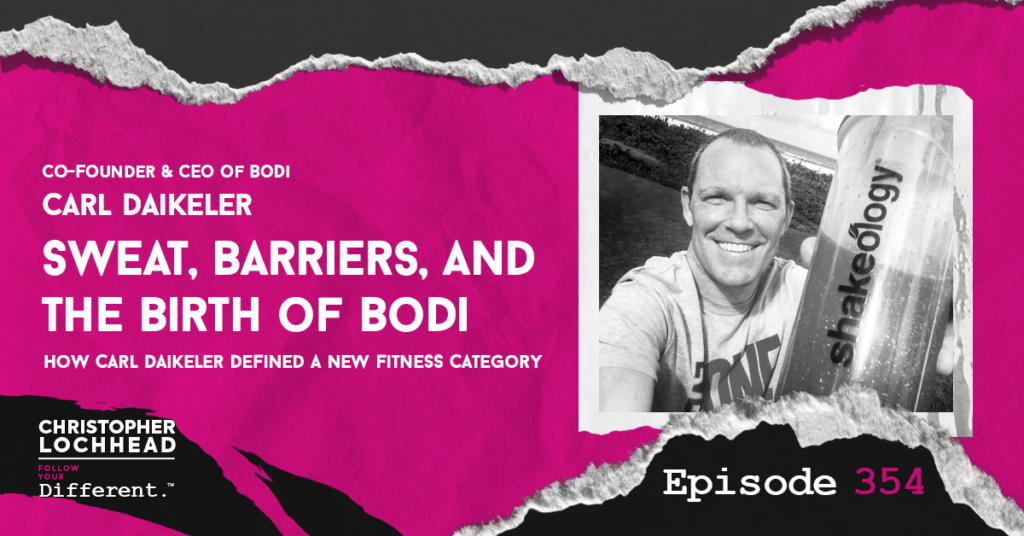
Podcast: Play in new window | Download (Duration: 1:08:54 — 47.3MB) | Embed
Subscribe: Apple Podcasts | Spotify | Pandora | RSS | More
On this episode of Christopher Lochhead: Follow your Different, we have a conversation with Carl Daikeler, the visionary CEO of BODi (formerly known as Beachbody).
We explore Carl’s remarkable journey in the fitness industry, beginning with the inception of the eight-minute abs video series—a concept that sprang from his own need for a quick and effective workout solution.
Carl’s story is not just about the creation of a fitness program; it’s about identifying a gap in the market and filling it with innovation. The eight-minute abs series not only became a household name but also gained unexpected fame with its mention in the movie “Something About Mary.” If you’re interested to learn more, consider giving this episode a try.
You’re listening to Christopher Lochhead: Follow Your Different. We are the real dialogue podcast for people with a different mind. So get your mind in a different place, and hey ho, let’s go.
Carl Daikeler on the Power of Media in Fitness
Carl shares the challenges and triumphs of launching other renowned fitness programs like Power 90 and P90X. He emphasizes the crucial role of media in delivering fitness instruction and the concept of structured home fitness. Reflecting on the success of P90X, Carl reveals the strategic thinking behind creating new fitness programs, such as Insanity, and the lessons learned along the way.
The impact of Carl’s fitness programs on individuals is profound, to say the least. They offer a sense of accomplishment and success to those who may have struggled with traditional gym environments. This, in turn, sheds light on the marketing and strategic decisions that propelled these programs to success and how Beachbody evolved into a digital powerhouse.
The Evolution of Fitness: From Products to Subscriptions
In the ever-changing landscape of the fitness industry, Carl explains the shift from selling products to embracing a subscription model. In fact, BODi has successfully transitioned to this model, boasting over a million subscribers.
However, the journey hasn’t been without its challenges, such as subscription fatigue. As such, Carl highlights the importance of evolving the business model to include digital program purchases alongside subscriptions.
The unique features of their digital platform, such as virtual trainers who can make real-time corrections for dozens of participants, also helped ensure a high-quality experience. This flexibility extends to allowing users to download programs for offline use, catering to the modern consumer’s need for convenience and customization.
Owning the Morning and the Holistic Approach to Health
The conversation took a personal turn as Carl shares his morning routine, which includes a health shot and Shakeology. He stressed the significance of starting the day with healthy habits to set the tone for overall well-being.
This led to the discussion of a controversial topic in weight loss pharmaceuticals, like Ozempic, and the dangers of relying on drugs without making necessary lifestyle changes. Carl advocates for a holistic approach to health, emphasizing the need to build and preserve muscle for long-term vitality.
They ponder whether people use these drugs as a kickstarter for a healthier lifestyle or merely as a shortcut. Carl introduces the concept of “health esteem,” advocating for building a lifestyle centered around health and activity rather than focusing solely on weight loss.
To hear more from Carl Daikeler and how to build up your body the healthy way, download and listen to this episode.
Bio
Carl Daikeler is the visionary CEO and Co-founder of BODi, a revolutionary health and wellness company. With over two decades of experience in the fitness industry, Carl is on a mission to transform lives through innovative approaches to exercise and nutrition.
Carl’s journey began with a passion for helping others achieve their fitness goals. Drawing from his own struggles with weight management and a desire to make a difference, he co-founded BODi to provide people with accessible and effective solutions for sustainable health transformations.
Under Carl’s leadership, BODi has become a beacon of inspiration, empowering individuals worldwide to take control of their well-being. His relentless dedication to creating impactful programs and fostering a supportive community has earned him recognition as a trailblazer in the industry.
Beyond his role at BODi, Carl is a fervent advocate for health advocacy and philanthropy. He continuously strives to make a positive impact on society by promoting healthy lifestyles and supporting charitable initiatives.
With Carl Daikeler at the helm, BODi is not just a company; it’s a movement towards a healthier, happier world. Join us as we embark on this transformative journey together.
Links
Connect with Carl Daikeler!
LinkedIn | Instagram | Twitter / X | Facebook
We hope you enjoyed this episode of Christopher Lochhead: Follow Your Different™! Christopher loves hearing from his listeners. Feel free to email him, connect on Facebook, Twitter, Instagram, and subscribe on Apple Podcast / Spotify!
353 Russia Could Have Been Legendary: Russia’s Turbulent Transition with Kevin Maney, NYT Bestselling Author of Red Bottom Line
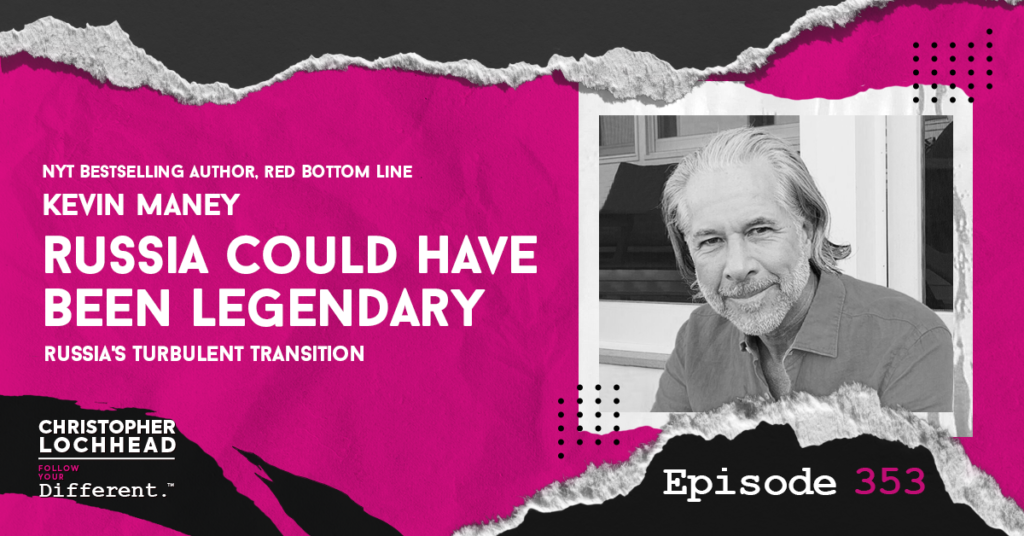
Podcast: Play in new window | Download (Duration: 1:09:19 — 47.6MB) | Embed
Subscribe: Apple Podcasts | Spotify | Pandora | RSS | More
On this episode of Christopher Lochhead: Follow Your Different, we are joined again by a dear friend, Kevin Maney, as he shares stories about the missed opportunities for innovation after Soviet Union’s fall.
Kevin Maney has a new book out called Red Bottom Line, wherehe tells his firsthand experience as a young USA Today reporter in Russia during the time. From the optimism of Gorbachev’s era to the disillusionment under Putin, Christohper and Kevin also explore Russia’s technological transformation, societal issues and geopolitical impact.
You’re listening to Christopher Lochhead: Follow Your Different. We are the real dialogue podcast for people with a different mind. So get your mind in a different place, and hey ho, let’s go.
Kevin Maney on the Journalism in Russia during the late 80s and early 90s
Kevin starts off the conversation with a description of the conditions in Russia before, during, and after the fall of the Soviet Union. He describes when Mikhail Gorbachev started loosening restrictions and allowing more foreign correspondents into Russia, which allowed journalists like Kevin to make it to Russian soil as early as 88-88.
Though some restrictions were lifted, Kevin recalls that they still had to jump through so many hoops just to get there, as there aren’t exactly direct routes or flights going from America to Russia at the time.
At this point in time, a lot of Americans and other Westerners were flocking to Russia, as demand for common consumer products skyrocket. Things like toothpaste and deodorant were being sold left and right, things that weren’t originally available locally. Kevin observed this trend and proposed to his editor to let him cover this economic and financial phenomenon that is happening in the Soviet Union.
Kevin Maney on Life in Russia during Economic Hardship
As Kevin recalls the situation then, he saw a country that was on its last legs, and its people trying desperately to live as normal as they could. He observed certain stores that only allowed foreigners or people with non-local currencies to shop, as they know it had more buying power in the long run.
Local residents were crowding other stores, either to purchase clothing items or to replenish their essential supplies. In department stores, shelves were nearly bare, with only toys and luxury items remaining unsold. Everyone was scooping up anything they could find.
Seeing all that in contrast to people’s lives in America was disheartening, to say the least.
The Opening of the First McDonalds in Russia during the 90s
Given all that, Kevin still saw some hope for the country as they start rebuilding themselves from within. That, and all the companies that are now flooding into Russia to help supplies their needs and ideally, boost their economy.
One such company was McDonalds, who Kevin has a fond story to tell. He shares that on one of his trips back to Russia, he just happened to be on the same flight as George Kohan, the biggest McDonalds franchisee in Canada. George was on his way to Moscow to check his plans to build a branch there, which eventually became the first of many McDonalds built in Russia.
Kevin got to talk with George Kohan on how things were going with building a business on foreign soil, and the procedures and machinations he had to go through to finally get approved to open his business there.
To hear more from Kevin Maney and his stories from the redeveloping Russia in the 90s, download and listen to this episode.
Bio
Kevin Maney is cofounder of Category Design Advisors, where he works with CEOs and executive teams to develop and execute strategies to design and dominate markets. He is also a multi-time bestselling author and journalist who writes about technology and society.
His most recent book, UnHealthare: A Manifesto for Health Assurance, was co-authored with venture capitalist Hemant Taneja and Jefferson Health CEO Steve Klasko. It came out in 2020, and tees up how healthcare will evolve in the post-Covid era.
His previous book, Unscaled: How AI and a New Generation of Upstarts are Creating the Economy of the Future, was co-authored with Hemant Taneja and came out in 2018.
His book Play Bigger: How Pirates, Dreamers and Innovators Create and Dominate Markets (Harper Business, 2016), is a collaboration with Silicon Valley veterans Al Ramadan, Dave Peterson and Christopher Lochhead. The book introduces business to the idea of category design and gave birth to the advisory firm Category Design Advisors, where I’m now a partner.
Other Works
He co-authored, with TIBCO CEO Vivek Ranadive, The Two-Second Advantage: How We Succeed by Anticipating the Future…Just Enough. Merging brain science and computer science, it was a 2011 New York Times bestseller, and predicted much of the conversation we’re now having about artificial intelligence.
He also co-wrote Making the World Work Better, which marked IBM’s centennial in 2001. More than 600,000 copies are in print in a dozen languages.
His other books include Trade-Off: Why Some Things Catch On, and Others Don’t, The Maverick and His Machine: Thomas Watson Sr. and the Making of IBM and Megamedia Shakeout.
Over the years, he’s been a contributor to Fortune, The Atlantic, Fast Company and ABC News, among other media outlets. He was a contributing editor at Conde Nast Portfolio during its brief run from 2007 to 2009. For 22 years, he was a columnist, editor and reporter at USA Today.
He’s appeared frequently on television and radio, including CNN, CBS Sunday Morning and NPR, and lectured at conferences and universities, including New York University, UNC in Chapel Hill, and his alma mater, Rutgers.
Kevin also plays music with other New York rockers in a band called Total Blam Blam.
Links
Follow Kevin Maney today!
Website: KevinManey.com | CategoryDesignAdvisors.com
LinkedIn: in/KevinManey | company/CategoryDesign
Facebook: fb.com/CategoryDesign
Twitter: @KManey | @CD_Advisors
Instagram: @CategoryDesign
Check out his new book: Red Bottom Line
We hope you enjoyed this episode of Christopher Lochhead: Follow Your Different™! Christopher loves hearing from his listeners. Feel free to email him, connect on Facebook, Twitter, Instagram, and subscribe on Apple Podcast / Spotify!
352 Big Bets and the Future of Leadership with John Rossman, Author of Big Bet Leadership
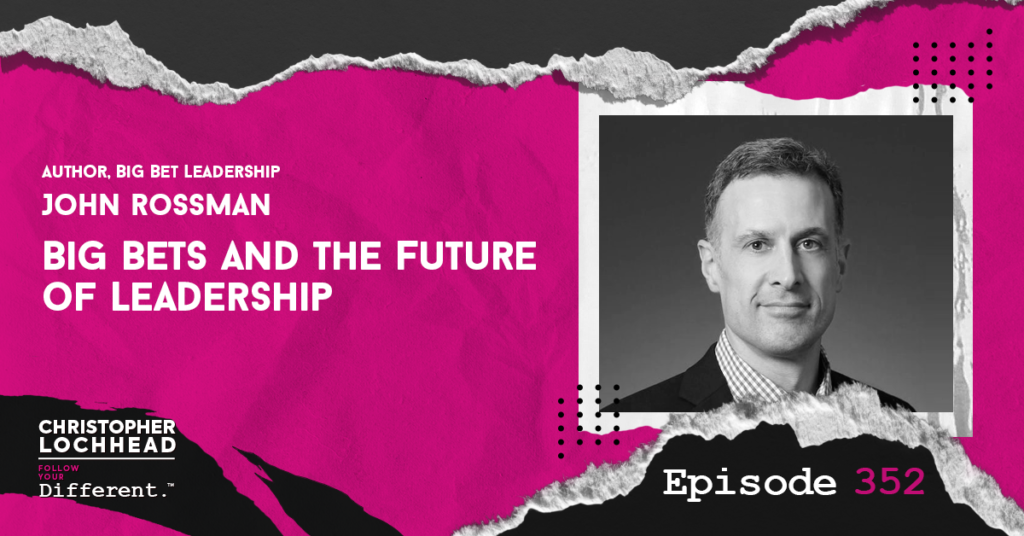
Podcast: Play in new window | Download (Duration: 1:24:53 — 58.3MB) | Embed
Subscribe: Apple Podcasts | Spotify | Pandora | RSS | More
On this episode of Christopher Lochhead: Follow Your Different, we are joined by our friend and multi-time guest, John Rossman.
John Rossman is a Master of Innovation and former Amazon Executive who brings to the table his insights from his new book, Big Bet Leadership: Your playbook for winning in the hyper digital era. His experiences with industry giants illuminate the path for making bold, transformative decisions.
This conversation is a deep dive into the courage and strategy required to lead in uncertain times, focusing on big bets that redefine industries, in an era where navigating technological change is crucial.
You’re listening to Christopher Lochhead: Follow Your Different. We are the real dialogue podcast for people with a different mind. So get your mind in a different place, and hey ho, let’s go.
John Rossman on Category Design and Big Bet Leadership
Christopher and John discuss the impact of category transformation and AI on businesses. John expresses gratitude for Christopher’s influential work on category design, which has shaped his thinking and client engagements positively.
They then delve into the challenges faced by companies in making big bets and succeeding in transformations, particularly in the context of AI and digital eras. Both acknowledge the historical struggle of major corporations to adapt and innovate compared to startups.
John emphasizes the need for senior leaders to rethink traditional approaches and embrace new strategies to navigate the hyper-digital era successfully and achieve substantial productivity gains.
John Rossman on Bold Moves vs Incremental Improvements
Christopher and John explore the necessity of both incremental improvements and bold moves in corporate leadership. They stress the importance of executives balancing ongoing operations with strategic innovation, emphasizing the need for a portfolio of big bets alongside incremental changes.
Drawing on insights from successful leaders like Satya Nadella, Jeff Bezos, and Elon Musk, they highlight the challenges of leading transformations in established companies. They propose a framework centered on creating clarity, maintaining velocity, and accelerating risk and value to guide organizations towards systematic transformation.
Customer Obsession and Customer-Driven Innovation
Christopher and John then talk about the importance of customer obsession and strategic thinking in driving successful business transformations. They critique competitor-focused strategies and highlight the significance of understanding customer problems deeply.
Drawing from Amazon’s approach, they emphasize the need for a portfolio of hypotheses and ideas, continuously testing and iterating before scaling.
Both caution against premature scaling and advocate for a patient approach that prioritizes operational readiness and sustainability. They stress that a combination of tactics, including customer obsession, agile methodologies, and strategic experimentation, is essential for systematic innovation and transformation.
To hear more from John Rossman and how to make Big Bets for your company, download and listen to this episode.
Bio
John Rossman
Digital and Innovation Advisor
Mr. Rossman is an expert at digital business models, operations and organizing programs. He has led engagements on developing innovation processes, Internet of Things strategies, marketplace and API driven platform business models.
He is a sought-after speaker on creating a culture of operational excellence and innovation.
Mr. Rossman has worked with clients across various industries, including retail, insurance, education, healthcare, consumer products, industrial products and transportation.
Mr. Rossman’s notable assignments include The Bill and Melinda Gates Foundation, Microsoft, Nordstrom and several of the world’s leading retail and insurance organizations.
Prior to Rossman Partners, John was a Managing Director at Alvarez and Marsal, a performance improvement consulting firm.
Prior to A&M, John was an executive at Amazon.com where he launched the Marketplace business and third-party selling platform, and ran the merchant services business.
Links
Connect with John Rossman!
LinkedIn: in/John-Rossman | Twitter: @JohnERossman | Get the book: Big Bet Leadership
We hope you enjoyed this episode of Christopher Lochhead: Follow Your Different™! Christopher loves hearing from his listeners. Feel free to email him, connect on Facebook, Twitter, Instagram, and subscribe on Apple Podcast / Spotify!
351 The Harm of Childhood Trauma and the Hope of Resilience with Dr. Marc Hauser, Author of Vulnerable Minds
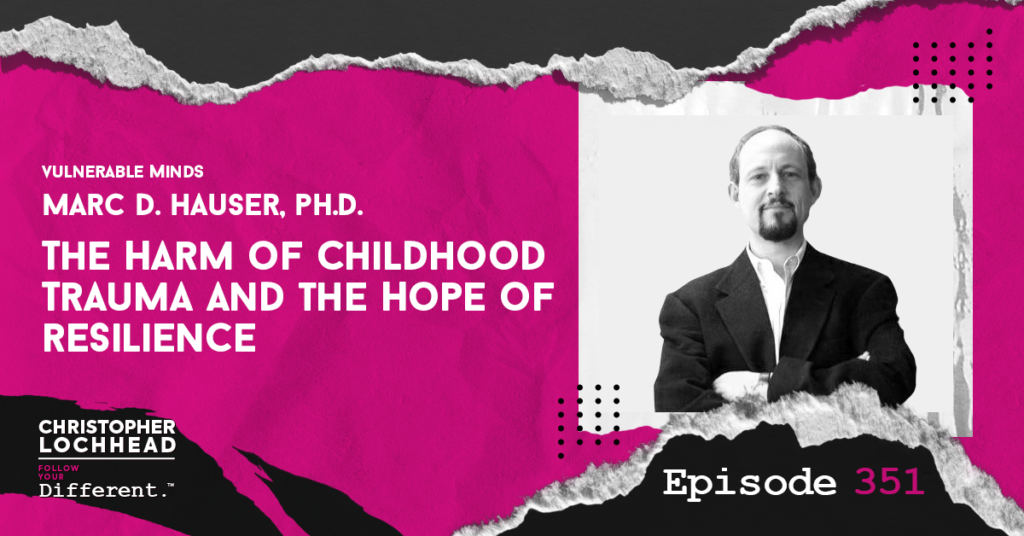
Podcast: Play in new window | Download (Duration: 1:10:00 — 48.1MB) | Embed
Subscribe: Apple Podcasts | Spotify | Pandora | RSS | More
On this episode of Christopher Lochhead: Follow Your Different, we are joined by educator, neuroscientist, and former Professor of Evolutionary Biology and Psychology at Harvard, Dr. Marc Hauser.
Dr. Marc Hauser has a new book out called Vulnerable Minds: The harm of childhood trauma in the hope of resilience.
You should also know this is a very adult conversation, as it deals with tough topics like childhood abuse. If you are not comfortable with such topics, you have been advised.
You’re listening to Christopher Lochhead: Follow Your Different. We are the real dialogue podcast for people with a different mind. So get your mind in a different place, and hey ho, let’s go.
Dr. Marc Hauser on Trauma and Compassion Fatigue in Working with Children
Dr. Marc Hauser, who works extensively with trauma victims, discusses the challenges of maintaining emotional well-being while dealing with the profound suffering of his clients. He acknowledges the risk of compassion fatigue and emphasizes the importance of self-care.
Dr. Hauser reveals his coping mechanisms, including physical activity and the supportive environment of his home life. He also highlights the necessity of balancing empathy for his clients with maintaining professional boundaries to avoid becoming overwhelmed.
Comparing his work to that of his veterinarian wife, he underscores the unique emotional demands of his profession, particularly when faced with physically aggressive clients. Despite the difficulties, Dr. Hauser emphasizes the importance of maintaining compassion and offering hope for a better tomorrow to those he serves.
Dr. Marc Hauser on Childhood Trauma and its Impact on Mental and Physical Health
Dr. Marc Hauser explains the significance of TRACEs (Trauma Response to Adverse Childhood Experiences) and RRACEs (Resilience Response to Adverse Childhood Experiences) alongside ACEs (Adverse Childhood Experiences). He elaborates on how ACEs, identified through a questionnaire developed by Dr. Vincent Felitti, are linked to physical and mental health issues.
Dr. Hauser highlights the transformative impact of understanding and addressing childhood trauma through TRACEs and RRACEs, emphasizing the importance of trauma-informed care and resilience-building strategies. It underscores the need for a holistic approach to supporting individuals affected by childhood trauma, considering both the adverse effects and potential pathways to resilience and healing.
Misconception on the ACE score
Dr. Hauser discusses the misconception surrounding ACE scores, emphasizing that they were never intended as individual predictors but as population measures. He explains how ACE scores were misinterpreted and integrated into policies like insurance coverage in California based on individual scores.
Christopher questions the implications of ACE scores on insurance premiums and treatment eligibility. Dr. Hauser clarifies that ACE scores are not accurate predictors of individual health risks but rather reflect population trends. He compares ACE scores to heritability measures, highlighting that they indicate predispositions but not definitive outcomes for individuals.
Dr. Hauser underscores the importance of understanding ACE scores as measures of experience rather than direct responses to adverse childhood experiences, introducing the concepts of TRACEs and RRACEs for a more nuanced understanding of trauma response.
To hear more from Dr. Marc Hauser on childhood trauma, download and listen to this episode.
Bio
Links
Connect with Dr. Marc Hauser
LinkedIn | Twitter / X | Marc D. Hauser website
We hope you enjoyed this episode of Christopher Lochhead: Follow Your Different™! Christopher loves hearing from his listeners. Feel free to email him, connect on Facebook, Twitter, Instagram, and subscribe on Apple Podcast / Spotify!
350 The AI Startup Teaching Kids To Build Tech Startups with Hannah Grady Williams and Ted Dintersmith of d’Skills
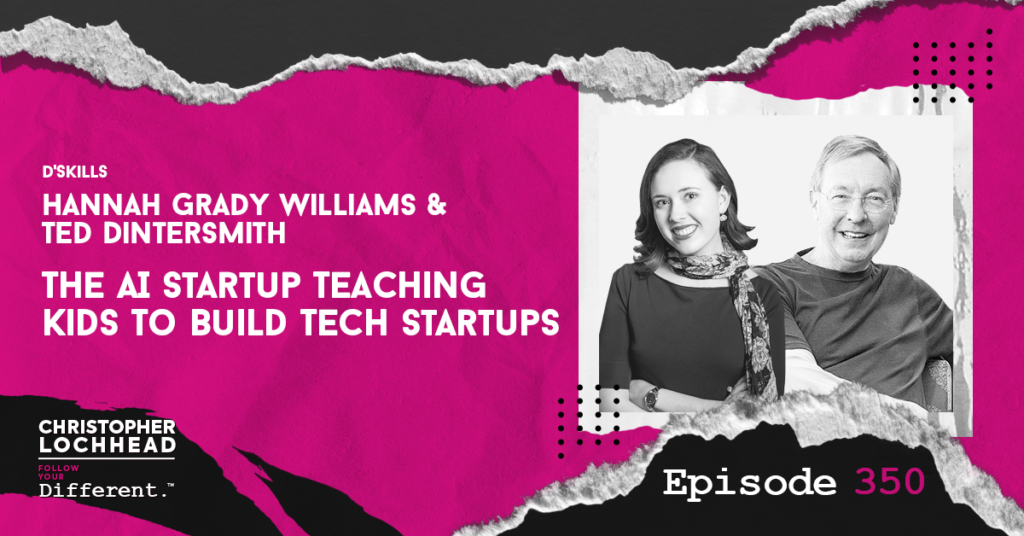
Podcast: Play in new window | Download (Duration: 1:09:56 — 48.0MB) | Embed
Subscribe: Apple Podcasts | Spotify | Pandora | RSS | More
On this episode of Christopher Lochhead: Follow Your Different, we bridge the gap between native analogs and native digitals in business by having a dialogue between the VC legend Ted Dintersmith and one of the new legends of her generation, Hannah Grady Williams.
Ted Dintersmith is a VC legend on the East Coast. He’s a former venture capitalist and a founding member of Charles River ventures, where he spent a significant portion of his career investing in and nurturing technology startups. Transitioning his focus toward education, he’s become an influential advocate for innovative educational practices.
Hannah Grady Williams is the legendary founder and CEO of d’Skills. She’s recognized for her innovative approach to shaping education and her efforts to equip the next generation with the tools necessary for success in the modern digital landscape. And, oh yeah, she’s only 25 years old.
Hannah, Ted and Chris discuss the challenges of bridging generational gaps in education as native digital and native analogs. Along with the importance of introducing AI into education to empower students with real world projects. You’ll be shocked at the transformative impact of the skills program on student’s confidence, problem solving abilities, and career prospects.
You’re listening to Christopher Lochhead: Follow Your Different. We are the real dialogue podcast for people with a different mind. So get your mind in a different place, and hey ho, let’s go.
Hannah Grady Williams on Education Reform and Preparing Students for the Workforce
After a quick introduction between the two guests, the conversation starts with Hannah recounting a pivotal moment from her childhood when her dad involved her in a real estate deal at age 12, sparking her interest in applying academic skills to real-world situations.
This experience led her to question the traditional education system’s effectiveness in preparing students for modern careers, especially in the age of AI. She and Christopher discuss the shortcomings of current education models, emphasizing the importance of practical skills over rote memorization.
Both share a vision of revolutionizing education by shifting focus from test scores to impact portfolios, where students showcase real-world projects demonstrating their skills. They aim to equip students with digital and AI skills through hands-on projects, enabling them to make tangible contributions to businesses. Ultimately, they envision a million students graduating high school with impact portfolios, ready for the demands of the modern workforce.
Ted Dintersmith on the Disconnect between Traditional School Education and Skill Development
Christopher and Ted discuss the stark difference between traditional education and teaching skills relevant to the modern workforce, particularly in the context of AI. They note the reluctance of many educational institutions to embrace AI tools, preferring to view them as potential cheating aids rather than productivity enhancers.
Ted highlights the disconnect between traditional schooling and the demands of the job market, where college graduates often lack marketable skills and face uncertain career prospects. He emphasizes the need for parents to recognize the evolving nature of jobs and the importance of equipping students with adaptable skills. They see initiatives like Hannah’s d’Skills as offering a path for students to create their own fulfilling careers, distinct from the outdated model of relying solely on degrees and conventional career paths.
Education Priorities and Student Motivation
Adding more on the topic of issues concerning traditional education, Ted also emphasizes that education’s central issue isn’t test scores or learning loss but rather the erosion of student motivation and purpose.
He highlights the success of programs like d’Skills in engaging students, enabling them to pursue meaningful projects they find important. These initiatives contrast starkly with traditional schooling, where students often lack enthusiasm and see little relevance in their coursework.
Ted underscores the importance of empowering students to engage in real-world projects that matter to them, a stark departure from the test-focused education system. Christopher contrasts the enthusiasm and results of students involved in programs like d’Skills with those in traditional education, noting the marked difference in attitude and approach.
To hear more from Hannah Grady Williams and Ted Dintersmith on the current state of education and how to improve upon it, download and listen to this episode.
Bio
Hannah Grady Williams is the founder/CEO of d’Skills. d’Skills is a one-of-a-kind digital training community that teaches young people entrepreneurship, AI skills and how to create a revenue producing business in 10 weeks.
Links
Connect with Hannah and d’Skills!
d’Skills | LinkedIn | Twitter/X
Connect with Ted Dintersmith!
Website | What School Could Be | LinkedIn
We hope you enjoyed this episode of Christopher Lochhead: Follow Your Different™! Christopher loves hearing from his listeners. Feel free to email him, connect on Facebook, Twitter, Instagram, and subscribe on Apple Podcast / Spotify!
349 October 7th Horror To Hope: A Tech Startup For Every Fallen Israeli with Izhar Shay & Ophir Shay, Next October Co-Founders
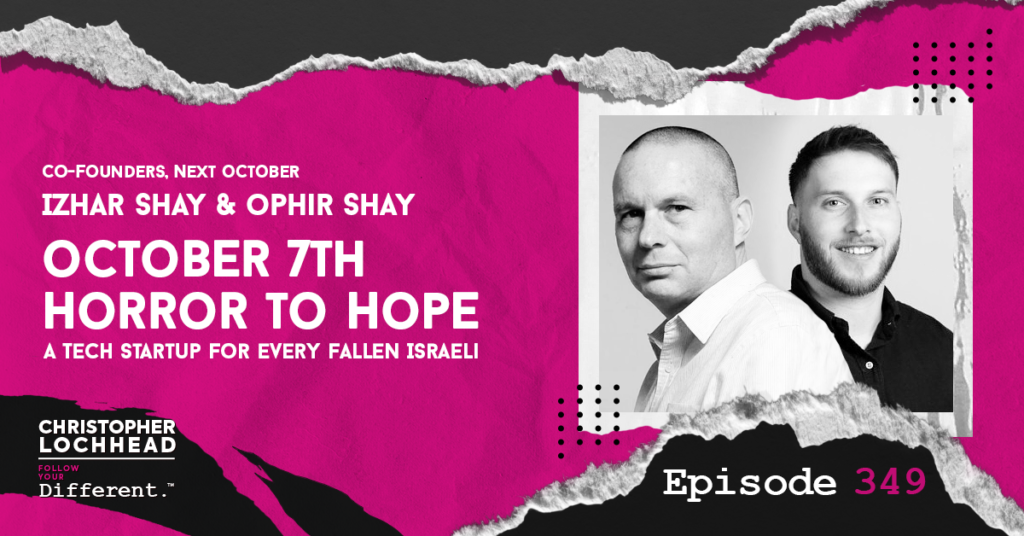
Podcast: Play in new window | Download (Duration: 1:29:04 — 61.2MB) | Embed
Subscribe: Apple Podcasts | Spotify | Pandora | RSS | More
On this episode of Christopher Lochhead: Follow Your Different, we are joined by Izhar and Ophir Shay, a father and brother to Israelis who have lost their lives in the Hamas attack. Today, they share how they chose to honor their fallen, in what can only be described as, Different.
Izhar Shay is an entrepreneur – a venture capitalist, very successful in the startup community and startup nation in Israel. And he’s a former Israeli Member of Parliament who served as the Minister of Science and Technology. His son, Ophir Shay, is also an entrepreneur, and he has a background in marketing and customer support. Both men have served honorably in the IDF.
In Israel, it is customary to plant a tree for fallen Israelis taken in war or terrorism. But Izhar and Ophir chose to honor them by starting a startup called Next October, a nonprofit on a mission to create and build a new successful Israeli startup for every person murdered or kidnapped on October 7. It’s an extraordinary vision. How you can take horror and turn it into hope and prosperity.
You’re listening to Christopher Lochhead: Follow Your Different. We are the real dialogue podcast for people with a different mind. So get your mind in a different place, and hey ho, let’s go.
Ophir Shay and Izhar Shay on Coping with Loss and Grief
When asked by Christopher on how they are doing, Ophir expresses optimism amidst difficulty, mentioning progress with connecting companies and families.
Izhar then reflects on the challenge of answering “how are you doing?” following a family tragedy on October 7, losing their youngest son, Yaron, a soldier. Christopher empathizes, sharing his experience of loss and the struggle with such questions.
Izhar details Yaron’s life, highlighting his values as both an Israeli and American citizen. Yaron is remembered as a remarkable individual, cherished by his family, and honored for his service.
Memories of Yaron and His Passions in Life
Izhar and Ophir continue the conversation about Yaron’s life, one that is filled with different passions, be it in music, watching and playing different sports, and tattoos.
Izhar further reflects on Yaron’s passion for sports, spanning across continents and connecting people. He highlights Yaron’s dedication to his favorite teams and how his commitment was recognized even in his funeral.
Christopher reciprocates, sharing his lifelong passion for sports, particularly football and hockey. He recounts a story about NBA Hall of Famer Bill Walton, emphasizing the joy of being an enthusiastic fan and celebrating one’s passions.
Both agree that sports serve as a unifying force, fostering connections and bonding within families and communities.
On accepting New and Old Communities
Continuing on that line of thought, Christopher shares his experiences of bonding with his nephews over football, and introducing them to different activities, and in effect, different communities. He notes that music and sports communities tend to be more accepting, as while options might differ vastly from person to person, it’s still an avenue to get a conversation started and to have something common to talk about even if it’s the first time you have met the other person.
Ophir agrees with this sentiment, and also adding that at the end of the day, it’s about embracing a new community, or even finally embracing one that you’ve been part of all along. Nothing is stopping anyone from being hardcore fans of their teams, as long as they show mutual respect for others and the teams they support. And isn’t that the point of it all in the end?
To hear more from Izhar Shay and Ophir Shay, and how their startups honor their fallen sons and brothers, download and listen to this episode.
Bio
Izhar Shay
Cofounder of Next October.
Former Minister of Science & Technology and MK.
High-Tech Entrepreneur, Venture Capital Investor, Director & Chairman.
Founder, Start-Up Stadium, the largest online community of Israeli entrepreneurs
A former columnist at “Globes”.
Founder of the “High-Tech Ba’Pkakim” podcast and radio show.
Ophir Shay
Cofounder of Next October.
Links
Connect with Izhar Shay and Ophir Shay!
Next October website | IsraelGives.org | Izhar’s Linkedin | Ophir’s LinkedIn
We hope you enjoyed this episode of Christopher Lochhead: Follow Your Different™! Christopher loves hearing from his listeners. Feel free to email him, connect on Facebook, Twitter, Instagram, and subscribe on Apple Podcast / Spotify!
348 How Young People Can Become AI Entrepreneurs In 10 Weeks with Hannah Grady Williams CEO of d’Skills
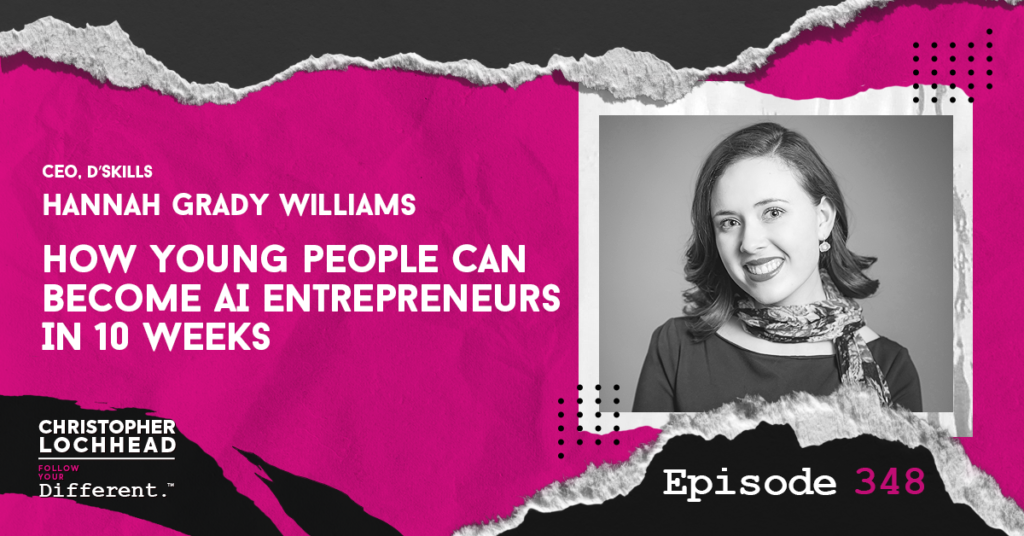
Podcast: Play in new window | Download (Duration: 51:35 — 35.4MB) | Embed
Subscribe: Apple Podcasts | Spotify | Pandora | RSS | More
On this episode of Christopher Lochhead: Follow Your Different, we unveil what’s really possible for young people when they’re set up to win as modern entrepreneurs, leveraging new AI technology. And who better to showcase it than the Gen Z whisperer for CEOs and executives, Hannah Grady Williams.
Hannah Grady Williams is back, and she’s here to talk about d’Skills. d’Skills is a one-of-a-kind digital training community that teaches young people entrepreneurship, AI skills, and how to create a revenue producing business in 10 weeks. And the superstars of this conversation are teenage AI entrepreneurs, Rory Straight and Anna Mitchell, two recent graduates of the d’Skills Program.
This episode will definitely challenge and inspire you to think about what’s possible for young people in new and different ways.
You’re listening to Christopher Lochhead: Follow Your Different. We are the real dialogue podcast for people with a different mind. So get your mind in a different place, and hey ho, let’s go.
Hannah Grady Williams on d’Skills and AI
The conversation starts off with Hannah introducing d’Skills and what they do.
Simply put, d’Skills is a hub where high schoolers are coming to learn 21st century skills and technology like ChatGPT and all its uses, and develop their skills further into projects that can make an impact in the market and the business world.
Hannah finds it fascinating how new technology can bridge the gap between young people’s ideas and the business world, and give birth to new products and categories that they can further develop as they learn more skills, or become more adept in their current ones.
Using AI for Business Projects while still in High School
Hannah also talks about a thing that she and d’Skills did over the summer called GPT Challengers Cup, in which they invited high schoolers from around the globe. And from this competition emerged Rory and Anna, who are also joining us on this episode.
It was astounding what ideas and end products that high schoolers were able to develop in the span of 30 days, but in the end, it was Rory & Anna’s project that emerged victorious.
What they ended up building was a Chrome extension that functions as an app that helps people study more efficiently by creating a comprehensive studying schedule based on the tasks you have registered in your to-do list.
Learning a New Skill in 15 Second or Less
Christopher then talks to Anna, who was handling the social media aspect of their team. This info was made more impressive by the simple fact that Anna has not handle social media marketing prior to the competition, and had to learn things through a bit of mentorship, but also doing a lot of research by herself.
“It’s actually funny that you asked that question because right now, I’m actually in a marketing class. And it’s super funny, because with all due respect to my teacher, I’ve learnt nothing in that class; It is like busy work, papers, everything. It’s crazy how much that I learned even like before the two weeks before the actual cup was over, and now that I’m doing it like in my free time, that it’s really not as hard to make it seem.
You don’t have to know all the business lingo and the economic terms. All you have to do is continue to push yourself and try new things and see what works and if it doesn’t work, then you know that doesn’t work and you move on from that.”
– Anna Mitchell
To hear more from Hannah, Rory, and Anna and the importance of skill-building with new technology in the business world, download and listen to this episode.
Bio
Hannah Grady Williams is the founder/CEO of d’Skills. d’Skills is a one-of-a-kind digital training community that teaches young people entrepreneurship, AI skills and how to create a revenue producing business in 10 weeks.
Aurora Straight
Hi, I’m Aurora, a STEAM enthusiast from Kansas with a deep passion for innovation and a strong presence in both academics and extracurricular activities. I compete in robotics and debate, channel my energy into basketball, and master precision in fencing. My ambition steers me towards aerospace engineering or a career in the Air Force, reflecting my desire to explore and innovate.
I co-founded ‘Acadium,’ a testament to my commitment to enhancing educational experiences through technology. My victory in the GPT Innovators Cup further underscores my ability to leverage AI for creative solutions. With internships at notable organizations under my belt, I’m honing my skills for real-world challenges.
My journey is more than just personal achievement; it’s about pushing the boundaries of what’s possible and inspiring others to do the same.
Anna Mitchell
Hello, I’m Anna, a high school student and digital art enthusiast turned innovator. My journey is marked by the creation of ‘Acadium,’ a Chrome extension that showcases my flair for digital solutions. Winning the GPT Innovators Cup was a milestone that affirmed my passion for AI-driven creativity. I’ve also contributed to our Community Cafe, enhancing our collective experience in the March sprint.
My hands-on approach to learning is evidenced by internships with leading organizations, including Peachtree Training Group, where I’ve applied my skills to real-world challenges. These experiences have not only honed my technical abilities but also fueled my ambition to innovate within the digital art and technology sphere.
Links
Connect with Hannah and d’Skills!
d’Skills | LinkedIn | Twitter/X
We hope you enjoyed this episode of Christopher Lochhead: Follow Your Different™! Christopher loves hearing from his listeners. Feel free to email him, connect on Facebook, Twitter, Instagram, and subscribe on Apple Podcast / Spotify!

